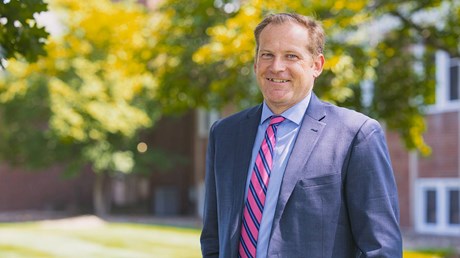Searched: LIVE
News
I believe President Biden should be drug-tested before the presidential debates. I explain why in my Newsmax show. Watch below […]
|
Get the most recent headlines and stories from Christianity Today delivered to your inbox daily.
|
The wager only scratches the surface of his relevance to a post-Christian era.
 It is a common lament that we live in a post-Christian era. This fact raises challenges to our witness to the world. Most of our audience thinks that, in G. K. Chesterton’s words, Christianity has been tried and found wanting (rather than found wanting and left untried). It is not considered a live option. How do we bear witness well in this cultural context? We might do well to reconsider one of the most enigmatic thinkers in Christian history, Blaise Pascal.Pascal suffers from a public relations problem. As the source of Pascal’s wager, he is often considered a gambling man. He urges the non-believer to bet that God exists. What does one have to lose? In Beyond the Wager: The Christian Brilliance of Blaise Pascal, philosopher Douglas Groothuis shows that there is more to Pascal’s life and thought than his most famous argument. Groothuis demonstrates that we have much to learn from this brilliant thinker. Pascal, he argues, is a crucial thinker for our time.Essential writingsPascal came on the scene in the 17th century, during the early years of the Scientific Revolution. Several of his works contributed to this movement, including treatises on the geometry of conic sections, theories of probability, and conclusions to extensive experiments he had done to test the possibility of a vacuum. He invented the first functional calculator, which he had built to help his father with his work of assessing taxes.His best-known works, however, focus on Christianity. In the Provincial Letters, Pascal defends the Jansenist movement, which was condemned by the Catholic church, against the Jesuits. The Jansenists emphasized that the depth of human sinfulness required a work of God for our salvation. The Christian life ...Continue reading... It is a common lament that we live in a post-Christian era. This fact raises challenges to our witness to the world. Most of our audience thinks that, in G. K. Chesterton’s words, Christianity has been tried and found wanting (rather than found wanting and left untried). It is not considered a live option. How do we bear witness well in this cultural context? We might do well to reconsider one of the most enigmatic thinkers in Christian history, Blaise Pascal.Pascal suffers from a public relations problem. As the source of Pascal’s wager, he is often considered a gambling man. He urges the non-believer to bet that God exists. What does one have to lose? In Beyond the Wager: The Christian Brilliance of Blaise Pascal, philosopher Douglas Groothuis shows that there is more to Pascal’s life and thought than his most famous argument. Groothuis demonstrates that we have much to learn from this brilliant thinker. Pascal, he argues, is a crucial thinker for our time.Essential writingsPascal came on the scene in the 17th century, during the early years of the Scientific Revolution. Several of his works contributed to this movement, including treatises on the geometry of conic sections, theories of probability, and conclusions to extensive experiments he had done to test the possibility of a vacuum. He invented the first functional calculator, which he had built to help his father with his work of assessing taxes.His best-known works, however, focus on Christianity. In the Provincial Letters, Pascal defends the Jansenist movement, which was condemned by the Catholic church, against the Jesuits. The Jansenists emphasized that the depth of human sinfulness required a work of God for our salvation. The Christian life ...Continue reading... |
While many refer to New York v. Trump as a “hush money” case, guest host Jeff Stein says that’s actually […]
|
Deconstruction is about tearing down, opposing, and moving away from? rather than? towards? anything or, for that matter, Anyone. At stake is whether we live in a world where it is possible to truly know truth and its Author, or not.?
|
Between Jesus' first coming and his second, there is his promise, “I am with you always” (Matthew 28:20).
|
Jonathan Roumie, best known for playing “Jesus Christ” in the hit series “The Chosen”, delivered a speech at Catholic University of America's commencement ceremony in Washington, D.C., on Saturday.
|
The Uniform Civil Code seeks “one nation, one law” to govern citizens' personal lives, but religious minorities fear hidden costs.
 In February, the northern Indian state of Uttarakhand passed a Uniform Civil Code (UCC), which aims to implement a common set of rules governing crucial aspects of life, including marriage, divorce, inheritance, and adoption.This code would supplant existing personal laws that religious groups in India currently ascribe to. Personal laws cover family-related matters such as marriage, divorce, child custody, adoption, property rights, and inheritance.If the ruling Hindu-led Bharatiya Janata Party (BJP) has its way, a UCC will eventually be implemented across all of India. (At present, Goa is the only other state with a UCC, derived from the Portuguese-era Civil Code of 1867.)The BJP’s push to implement a national UCC may bring relief for Christians in India, especially in terms of women’s inheritance rights. Under existing personal laws, Christian mothers cannot inherit their deceased children’s property. The UCC proposes to eliminate discriminatory provisions that favor male inheritance, potentially leading to more equitable inheritance rights for Christian women.But few of India’s religious minorities trust the BJP, whose policies have often been more harmful than helpful to Christian communities. In Assam, Christian leaders protested the passing of a bill banning “magical healing” as it unfairly impacted their custom of praying for the sick. Ministries including World Vision and the Evangelical Fellowship of India recently lost government authorization to collect foreign donations. Nine states now have anti-conversion laws in place, and believers have borne the brunt of religious unrest in these areas as a result.As this year’s general elections seem likely ...Continue reading... In February, the northern Indian state of Uttarakhand passed a Uniform Civil Code (UCC), which aims to implement a common set of rules governing crucial aspects of life, including marriage, divorce, inheritance, and adoption.This code would supplant existing personal laws that religious groups in India currently ascribe to. Personal laws cover family-related matters such as marriage, divorce, child custody, adoption, property rights, and inheritance.If the ruling Hindu-led Bharatiya Janata Party (BJP) has its way, a UCC will eventually be implemented across all of India. (At present, Goa is the only other state with a UCC, derived from the Portuguese-era Civil Code of 1867.)The BJP’s push to implement a national UCC may bring relief for Christians in India, especially in terms of women’s inheritance rights. Under existing personal laws, Christian mothers cannot inherit their deceased children’s property. The UCC proposes to eliminate discriminatory provisions that favor male inheritance, potentially leading to more equitable inheritance rights for Christian women.But few of India’s religious minorities trust the BJP, whose policies have often been more harmful than helpful to Christian communities. In Assam, Christian leaders protested the passing of a bill banning “magical healing” as it unfairly impacted their custom of praying for the sick. Ministries including World Vision and the Evangelical Fellowship of India recently lost government authorization to collect foreign donations. Nine states now have anti-conversion laws in place, and believers have borne the brunt of religious unrest in these areas as a result.As this year’s general elections seem likely ...Continue reading... |
From 1978 to 2008, he fought for legal recognition and freedom to worship for the Anabaptist denomination.
 Nguyen Quang Trung spent 30 years trying to get the Mennonite church recognized and registered by the government of Vietnam so that believers could meet and worship legally. When he finally succeeded, he celebrated the triumph with the words of the apostle Paul: “If we live, we live for the Lord; and if we die, we die for the Lord. So, whether we live or die, we belong to the Lord” (Rom. 14:8).Nguyen, a pastor and two-time president of Hội Thánh Mennonite Việt Nam (Vietnam Mennonite Church), died on March 23 at age 84. He was known for his “patient persistence” and “tireless efforts to promote and legally confirm a Mennonite presence in Vietnam,” Gerry Keener, former head of Eastern Mennonite Missions, told Anabaptist World.Nguyen was born in Gia Dinh, an industrial area outside Saigon. His mother died when he was five. His father was a committed Christian who raised him in the Evangelical Church of Vietnam, part of the Christian and Missionary Alliance.In his 20s, Nguyen found himself drawn to the Mennonites, spending a lot of time in a reading room established by the Eastern Mennonite Board of Missions and Charities. He took classes on English and the Bible and learned the Anabaptist teachings about nonviolence.“The same Spirit that empowered Jesus also empowers us to love enemies,” the missionaries taught Nguyen, “to forgive rather than to seek revenge, to practice right relationships, to rely on the community of faith to settle disputes, and to resist evil without violence.”Nguyen embraced the idea that Christians should “follow Christ in the way of peace” and practice “nonresistance,” even if they faced persecution and death.The ...Continue reading... Nguyen Quang Trung spent 30 years trying to get the Mennonite church recognized and registered by the government of Vietnam so that believers could meet and worship legally. When he finally succeeded, he celebrated the triumph with the words of the apostle Paul: “If we live, we live for the Lord; and if we die, we die for the Lord. So, whether we live or die, we belong to the Lord” (Rom. 14:8).Nguyen, a pastor and two-time president of Hội Thánh Mennonite Việt Nam (Vietnam Mennonite Church), died on March 23 at age 84. He was known for his “patient persistence” and “tireless efforts to promote and legally confirm a Mennonite presence in Vietnam,” Gerry Keener, former head of Eastern Mennonite Missions, told Anabaptist World.Nguyen was born in Gia Dinh, an industrial area outside Saigon. His mother died when he was five. His father was a committed Christian who raised him in the Evangelical Church of Vietnam, part of the Christian and Missionary Alliance.In his 20s, Nguyen found himself drawn to the Mennonites, spending a lot of time in a reading room established by the Eastern Mennonite Board of Missions and Charities. He took classes on English and the Bible and learned the Anabaptist teachings about nonviolence.“The same Spirit that empowered Jesus also empowers us to love enemies,” the missionaries taught Nguyen, “to forgive rather than to seek revenge, to practice right relationships, to rely on the community of faith to settle disputes, and to resist evil without violence.”Nguyen embraced the idea that Christians should “follow Christ in the way of peace” and practice “nonresistance,” even if they faced persecution and death.The ...Continue reading... |
In the country's most secular state, tiny congregations have made a big impact by their disaster response.
 For weeks, Tárik Rodriguez had been working on bringing a guest preacher and worship leader from across the country to help his church celebrate its third anniversary. In 2021, Rodriguez and a small team launched Viela da Graça Igreja in Novo Hamburgo, a small city in Brazil’s most southern province, Rio Grande do Sul.Then, it started raining.The floods have done more than interrupt the small Reformed congregation’s celebratory plans. They’ve devastated the community. The storms that began at the end of April struck Rio Grande do Sul’s most densely populated areas and have killed at least 116 people. Around 130 people are still missing. The high water has closed roads and even the airport, which has grounded flights until May 30. As of Friday, May 10, nearly 400,000 people have been displaced from their homes and 70,772 are in public shelters.Some of those have found their way to Viela da Graça, which is located on higher ground and has been largely protected from a water breach. Since May 4, Rodriguez and members of the 75-person congregation have been hosting around 50 people in a two-bathroom, 3,500-square-foot building.“As Christians, we needed to open our doors,” Rodriguez says. “And that’s what we did.”Beyond the bathroom constraints, the situation has been less than ideal. There are frequent power cuts (1.2 million people have been affected by outages) and the building has lost access to both running and potable water because the sanitation company cannot treat the dirty floodwaters. A nearby residential condominium, which gets its water from a well, has provided drinking water and showers.Continue reading... For weeks, Tárik Rodriguez had been working on bringing a guest preacher and worship leader from across the country to help his church celebrate its third anniversary. In 2021, Rodriguez and a small team launched Viela da Graça Igreja in Novo Hamburgo, a small city in Brazil’s most southern province, Rio Grande do Sul.Then, it started raining.The floods have done more than interrupt the small Reformed congregation’s celebratory plans. They’ve devastated the community. The storms that began at the end of April struck Rio Grande do Sul’s most densely populated areas and have killed at least 116 people. Around 130 people are still missing. The high water has closed roads and even the airport, which has grounded flights until May 30. As of Friday, May 10, nearly 400,000 people have been displaced from their homes and 70,772 are in public shelters.Some of those have found their way to Viela da Graça, which is located on higher ground and has been largely protected from a water breach. Since May 4, Rodriguez and members of the 75-person congregation have been hosting around 50 people in a two-bathroom, 3,500-square-foot building.“As Christians, we needed to open our doors,” Rodriguez says. “And that’s what we did.”Beyond the bathroom constraints, the situation has been less than ideal. There are frequent power cuts (1.2 million people have been affected by outages) and the building has lost access to both running and potable water because the sanitation company cannot treat the dirty floodwaters. A nearby residential condominium, which gets its water from a well, has provided drinking water and showers.Continue reading... |
Matthew Warner, who had tweeted about gay marriage, is the latest in a string of Christian college faculty who have lost their jobs after being accused of theological misalignment.
 With glowing performance reviews and above-average student evaluations, by most measures Matthew Warner’s first year as a communications professor at Grace College was a triumph.But he spent most of that first year knowing it could be his last. After four months on the job, Warner was informed by the school’s president, Drew Flamm, that the board had “come to the conclusion that we don’t think it works out to move forward,” according to a recording obtained by Religion News Service.Warner’s termination is the latest in a string of professor terminations at Christian colleges seemingly tied to clashes over narrowing and often unspoken political and theological criteria.While Flamm didn’t specify the reasons for Warner’s dismissal, it was preceded by an online termination campaign clear about its goals. Launched by conservative influencers and Grace College stakeholders, the campaign demanded Warner’s removal due to his social media posts about LGBTQ rights, Black Lives Matter, and critiques of the GOP. Almost all the posts predated Warner’s employment at the college.Grace College declined to answer questions about Warner, saying it was a personnel matter. “Dr. Matt Warner fulfilled his agreement for the year. Grace College wishes Dr. Warner well in his future endeavors,” Norm Bakhit, Grace College’s chief officer of human resources, told RNS in a statement. Flamm did not offer further comment.Warner and his wife said they both left behind jobs and sold their home in metro Detroit to move with their three kids to Warsaw, Indiana, for Warner’s job at Grace. It was his dream position, they said, and noted that they gave up 60 percent of their ...Continue reading... With glowing performance reviews and above-average student evaluations, by most measures Matthew Warner’s first year as a communications professor at Grace College was a triumph.But he spent most of that first year knowing it could be his last. After four months on the job, Warner was informed by the school’s president, Drew Flamm, that the board had “come to the conclusion that we don’t think it works out to move forward,” according to a recording obtained by Religion News Service.Warner’s termination is the latest in a string of professor terminations at Christian colleges seemingly tied to clashes over narrowing and often unspoken political and theological criteria.While Flamm didn’t specify the reasons for Warner’s dismissal, it was preceded by an online termination campaign clear about its goals. Launched by conservative influencers and Grace College stakeholders, the campaign demanded Warner’s removal due to his social media posts about LGBTQ rights, Black Lives Matter, and critiques of the GOP. Almost all the posts predated Warner’s employment at the college.Grace College declined to answer questions about Warner, saying it was a personnel matter. “Dr. Matt Warner fulfilled his agreement for the year. Grace College wishes Dr. Warner well in his future endeavors,” Norm Bakhit, Grace College’s chief officer of human resources, told RNS in a statement. Flamm did not offer further comment.Warner and his wife said they both left behind jobs and sold their home in metro Detroit to move with their three kids to Warsaw, Indiana, for Warner’s job at Grace. It was his dream position, they said, and noted that they gave up 60 percent of their ...Continue reading... |
One of the founding leaders of Victory megachurch, he never stopped running to share the gospel.
 Ferdinand “Ferdie” Cabiling, a bishop at one of the Philippines’ largest megachurches who ran across the Philippines to raise money for disadvantaged students, died April 1, the day after Easter. He was 58 years old.Dubbed “the Running Pastor,” the moniker describes not only Cabiling’s epic race but how he lived his life and served as an evangelist. For 38 years, he was a vocational minister of Victory Christian Fellowship of the Philippines, which has nearly 150 locations in the country. The branch he led, Victory Metro Manila, averaged more than 75,000 people each Sunday. [Note: The author is a member of Victory Church and was a part of the late pastor's small group in 2014.]In the past two years, his focus was on teaching evangelism to Victory leaders. Every time he received a teaching invitation, his answer was always yes, said his assistant, Faye Bonifacio.“He was a maximizer,” Bonifacio said, noting that Cabiling developed a habit of taking short naps while parked at a gas station between long drives. “Because he liked to drive, he did a lot in a day.”Hours before his death, Cabiling had visited a church member at a hospital an hour away from his hometown of Cuyapo before parking his car at a gas station, likely for a break before heading to his next destination. It was there that an attendant found his lifeless body and rushed him to the hospital he had just visited. Cabiling had died of a heart attack.“He was a serious man of passion, action, and conviction,” wrote Steve Murrell, the founding pastor of Victory, the flagship church for the charismatic-leaning Every Nation Churches and Ministries, which has churches and campus ministries in ...Continue reading... Ferdinand “Ferdie” Cabiling, a bishop at one of the Philippines’ largest megachurches who ran across the Philippines to raise money for disadvantaged students, died April 1, the day after Easter. He was 58 years old.Dubbed “the Running Pastor,” the moniker describes not only Cabiling’s epic race but how he lived his life and served as an evangelist. For 38 years, he was a vocational minister of Victory Christian Fellowship of the Philippines, which has nearly 150 locations in the country. The branch he led, Victory Metro Manila, averaged more than 75,000 people each Sunday. [Note: The author is a member of Victory Church and was a part of the late pastor's small group in 2014.]In the past two years, his focus was on teaching evangelism to Victory leaders. Every time he received a teaching invitation, his answer was always yes, said his assistant, Faye Bonifacio.“He was a maximizer,” Bonifacio said, noting that Cabiling developed a habit of taking short naps while parked at a gas station between long drives. “Because he liked to drive, he did a lot in a day.”Hours before his death, Cabiling had visited a church member at a hospital an hour away from his hometown of Cuyapo before parking his car at a gas station, likely for a break before heading to his next destination. It was there that an attendant found his lifeless body and rushed him to the hospital he had just visited. Cabiling had died of a heart attack.“He was a serious man of passion, action, and conviction,” wrote Steve Murrell, the founding pastor of Victory, the flagship church for the charismatic-leaning Every Nation Churches and Ministries, which has churches and campus ministries in ...Continue reading... |
The Uniform Civil Code seeks “one nation, one law” to govern citizens' personal lives, but religious minorities fear hidden costs.
 In February, the northern Indian state of Uttarakhand passed a Uniform Civil Code (UCC), which aims to implement a common set of rules governing crucial aspects of life, including marriage, divorce, inheritance, and adoption.This code would supplant existing personal laws that religious groups in India currently ascribe to. Personal laws cover family-related matters such as marriage, divorce, child custody, adoption, property rights, and inheritance.If the ruling Hindu-led Bharatiya Janata Party (BJP) has its way, a UCC will eventually be implemented across all of India. (At present, Goa is the only other state with a UCC, derived from the Portuguese-era Civil Code of 1867.)The BJP’s push to implement a national UCC may bring relief for Christians in India, especially in terms of women’s inheritance rights. Under existing personal laws, Christian mothers cannot inherit their deceased children’s property. The UCC proposes to eliminate discriminatory provisions that favor male inheritance, potentially leading to more equitable inheritance rights for Christian women.But few of India’s religious minorities trust the BJP, whose policies have often been more harmful than helpful to Christian communities. In Assam, Christian leaders protested the passing of a bill banning “magical healing” as it unfairly impacted their custom of praying for the sick. Ministries including World Vision and the Evangelical Fellowship of India recently lost government authorization to collect foreign donations. Nine states now have anti-conversion laws in place, and believers have borne the brunt of religious unrest in these areas as a result.As this year’s general elections seem likely ...Continue reading... In February, the northern Indian state of Uttarakhand passed a Uniform Civil Code (UCC), which aims to implement a common set of rules governing crucial aspects of life, including marriage, divorce, inheritance, and adoption.This code would supplant existing personal laws that religious groups in India currently ascribe to. Personal laws cover family-related matters such as marriage, divorce, child custody, adoption, property rights, and inheritance.If the ruling Hindu-led Bharatiya Janata Party (BJP) has its way, a UCC will eventually be implemented across all of India. (At present, Goa is the only other state with a UCC, derived from the Portuguese-era Civil Code of 1867.)The BJP’s push to implement a national UCC may bring relief for Christians in India, especially in terms of women’s inheritance rights. Under existing personal laws, Christian mothers cannot inherit their deceased children’s property. The UCC proposes to eliminate discriminatory provisions that favor male inheritance, potentially leading to more equitable inheritance rights for Christian women.But few of India’s religious minorities trust the BJP, whose policies have often been more harmful than helpful to Christian communities. In Assam, Christian leaders protested the passing of a bill banning “magical healing” as it unfairly impacted their custom of praying for the sick. Ministries including World Vision and the Evangelical Fellowship of India recently lost government authorization to collect foreign donations. Nine states now have anti-conversion laws in place, and believers have borne the brunt of religious unrest in these areas as a result.As this year’s general elections seem likely ...Continue reading... |
From 1978 to 2008, he fought for legal recognition and freedom to worship for the Anabaptist denomination.
 Nguyen Quang Trung spent 30 years trying to get the Mennonite church recognized and registered by the government of Vietnam so that believers could meet and worship legally. When he finally succeeded, he celebrated the triumph with the words of the apostle Paul: “If we live, we live for the Lord; and if we die, we die for the Lord. So, whether we live or die, we belong to the Lord” (Rom. 14:8).Nguyen, a pastor and two-time president of Hội Thánh Mennonite Việt Nam (Vietnam Mennonite Church), died on March 23 at age 84. He was known for his “patient persistence” and “tireless efforts to promote and legally confirm a Mennonite presence in Vietnam,” Gerry Keener, former head of Eastern Mennonite Missions, told Anabaptist World.Nguyen was born in Gia Dinh, an industrial area outside Saigon. His mother died when he was five. His father was a committed Christian who raised him in the Evangelical Church of Vietnam, part of the Christian and Missionary Alliance.In his 20s, Nguyen found himself drawn to the Mennonites, spending a lot of time in a reading room established by the Eastern Mennonite Board of Missions and Charities. He took classes on English and the Bible and learned the Anabaptist teachings about nonviolence.“The same Spirit that empowered Jesus also empowers us to love enemies,” the missionaries taught Nguyen, “to forgive rather than to seek revenge, to practice right relationships, to rely on the community of faith to settle disputes, and to resist evil without violence.”Nguyen embraced the idea that Christians should “follow Christ in the way of peace” and practice “nonresistance,” even if they faced persecution and death.The ...Continue reading... Nguyen Quang Trung spent 30 years trying to get the Mennonite church recognized and registered by the government of Vietnam so that believers could meet and worship legally. When he finally succeeded, he celebrated the triumph with the words of the apostle Paul: “If we live, we live for the Lord; and if we die, we die for the Lord. So, whether we live or die, we belong to the Lord” (Rom. 14:8).Nguyen, a pastor and two-time president of Hội Thánh Mennonite Việt Nam (Vietnam Mennonite Church), died on March 23 at age 84. He was known for his “patient persistence” and “tireless efforts to promote and legally confirm a Mennonite presence in Vietnam,” Gerry Keener, former head of Eastern Mennonite Missions, told Anabaptist World.Nguyen was born in Gia Dinh, an industrial area outside Saigon. His mother died when he was five. His father was a committed Christian who raised him in the Evangelical Church of Vietnam, part of the Christian and Missionary Alliance.In his 20s, Nguyen found himself drawn to the Mennonites, spending a lot of time in a reading room established by the Eastern Mennonite Board of Missions and Charities. He took classes on English and the Bible and learned the Anabaptist teachings about nonviolence.“The same Spirit that empowered Jesus also empowers us to love enemies,” the missionaries taught Nguyen, “to forgive rather than to seek revenge, to practice right relationships, to rely on the community of faith to settle disputes, and to resist evil without violence.”Nguyen embraced the idea that Christians should “follow Christ in the way of peace” and practice “nonresistance,” even if they faced persecution and death.The ...Continue reading... |
The Uniform Civil Code seeks "one nation, one law" to govern citizens' personal lives, but religious minorities fear hidden costs.
|
As someone whose family once proudly embraced the? Democratic Party, I mourn the decision by three Democratic presidents to make the loss of life made into a business by unleashing the chemical abortion pill on the U.S. market. Chemical abortion pills, which end hundreds of thousands of lives annually, represent the dark legacy of Presidents? Bill Clinton,? Barack […]The post By Pushing Dangerous Abortion Pills, Democrats Have Failed Women For Decades appeared first on LifeNews.com.
|
The Uniform Civil Code seeks "one nation, one law" to govern citizens' personal lives, but religious minorities fear hidden costs.
 In February, the northern Indian state of Uttarakhand passed a Uniform Civil Code (UCC), which aims to implement a common set of rules governing crucial aspects of life, including marriage, divorce, inheritance, and adoption.This code would supplant existing personal laws that religious groups in India currently ascribe to. Personal laws cover family-related matters such as marriage, divorce, child custody, adoption, property rights, and inheritance.If the ruling Hindu-led Bharatiya Janata Party (BJP) has its way, a UCC will eventually be implemented across all of India. (At present, Goa is the only other state with a UCC, derived from the Portuguese-era Civil Code of 1867.)The BJP’s push to implement a national UCC may bring relief for Christians in India, especially in terms of women’s inheritance rights. Under existing personal laws, Christian mothers cannot inherit their deceased children’s property. The UCC proposes to eliminate discriminatory provisions that favor male inheritance, potentially leading to more equitable inheritance rights for Christian women.But few of India’s religious minorities trust the BJP, whose policies have often been more harmful than helpful to Christian communities. In Assam, Christian leaders protested the passing of a bill banning “magical healing” as it unfairly impacted their custom of praying for the sick. Ministries including World Vision and the Evangelical Fellowship of India recently lost government authorization to collect foreign donations. Nine states now have anti-conversion laws in place, and believers have borne the brunt of religious unrest in these areas as a result.As this year’s general elections seem likely ...Continue reading... In February, the northern Indian state of Uttarakhand passed a Uniform Civil Code (UCC), which aims to implement a common set of rules governing crucial aspects of life, including marriage, divorce, inheritance, and adoption.This code would supplant existing personal laws that religious groups in India currently ascribe to. Personal laws cover family-related matters such as marriage, divorce, child custody, adoption, property rights, and inheritance.If the ruling Hindu-led Bharatiya Janata Party (BJP) has its way, a UCC will eventually be implemented across all of India. (At present, Goa is the only other state with a UCC, derived from the Portuguese-era Civil Code of 1867.)The BJP’s push to implement a national UCC may bring relief for Christians in India, especially in terms of women’s inheritance rights. Under existing personal laws, Christian mothers cannot inherit their deceased children’s property. The UCC proposes to eliminate discriminatory provisions that favor male inheritance, potentially leading to more equitable inheritance rights for Christian women.But few of India’s religious minorities trust the BJP, whose policies have often been more harmful than helpful to Christian communities. In Assam, Christian leaders protested the passing of a bill banning “magical healing” as it unfairly impacted their custom of praying for the sick. Ministries including World Vision and the Evangelical Fellowship of India recently lost government authorization to collect foreign donations. Nine states now have anti-conversion laws in place, and believers have borne the brunt of religious unrest in these areas as a result.As this year’s general elections seem likely ...Continue reading... |
It wasn't only because of missionaries from the West, says a Tongan Australian theologian.
 Christian overseas missionaries were more successful in Oceania—the region spanning the Pacific Islands, Australia, Papua New Guinea, and New Zealand—than anywhere else in the world.In particular, people in the Pacific Islands (which include Fiji, Papua New Guinea, Samoa, Vanuatu, Tonga, and more) were receptive to the gospel because “their ancestors’ strong beliefs in a divine presence and in the afterlife made them very open to Christian faith,” wrote Jacqueline Ryle, a contributor to the 2021 reference volume Christianity in Oceania. Tongan Australian theologian Katalina Tahaafe-Williams says her research reveals the same: The growth of Christianity in the region was not because of white Europeans but rather due to Indigenous missionaries who translated Christianity in a way that made sense to locals.Tahaafe-Williams, who lives in Sydney, served as the Indigenous coeditor for the book alongside prominent global Christianity scholars Kenneth R. Ross and Todd M. Johnson.“Our goal was to recruit Indigenous writers from all over the region to contribute to this volume,” she explained. “It was my task to connect with potential authors, theologians, leaders, and church members from the Pacific Islands … we were very committed to finding, however challenging it might be, authors who were part of that particular culture, thereby making the work very authentic.”CT Global books editor Geethanjali Tupps spoke with Tahaafe-Williams on why Christianity flourished in the Pacific Islands, how migration patterns have impacted the church, and why the region shouldn’t serve as the poster child for climate change issues.Continue reading... Christian overseas missionaries were more successful in Oceania—the region spanning the Pacific Islands, Australia, Papua New Guinea, and New Zealand—than anywhere else in the world.In particular, people in the Pacific Islands (which include Fiji, Papua New Guinea, Samoa, Vanuatu, Tonga, and more) were receptive to the gospel because “their ancestors’ strong beliefs in a divine presence and in the afterlife made them very open to Christian faith,” wrote Jacqueline Ryle, a contributor to the 2021 reference volume Christianity in Oceania. Tongan Australian theologian Katalina Tahaafe-Williams says her research reveals the same: The growth of Christianity in the region was not because of white Europeans but rather due to Indigenous missionaries who translated Christianity in a way that made sense to locals.Tahaafe-Williams, who lives in Sydney, served as the Indigenous coeditor for the book alongside prominent global Christianity scholars Kenneth R. Ross and Todd M. Johnson.“Our goal was to recruit Indigenous writers from all over the region to contribute to this volume,” she explained. “It was my task to connect with potential authors, theologians, leaders, and church members from the Pacific Islands … we were very committed to finding, however challenging it might be, authors who were part of that particular culture, thereby making the work very authentic.”CT Global books editor Geethanjali Tupps spoke with Tahaafe-Williams on why Christianity flourished in the Pacific Islands, how migration patterns have impacted the church, and why the region shouldn’t serve as the poster child for climate change issues.Continue reading... |
 Based on around 6,000 surveys, an estimated 13,000 Holocaust survivors live in Jewish households across eight counties; 14% of these households include someone who identifies as LGBTQ+, and 37% of married couples are intermarried Based on around 6,000 surveys, an estimated 13,000 Holocaust survivors live in Jewish households across eight counties; 14% of these households include someone who identifies as LGBTQ+, and 37% of married couples are intermarried |
 |
 |
 Local churches across southern Brazil have opened their doors to provide shelter and aid to residents in areas of the country that have been devastated by catastrophic floods? that have claimed the lives of at least 136 people and left around 537,000 displaced.? Local churches across southern Brazil have opened their doors to provide shelter and aid to residents in areas of the country that have been devastated by catastrophic floods? that have claimed the lives of at least 136 people and left around 537,000 displaced.? |
 Advocates of physician-assisted suicide lobbied lawmakers in New York Tuesday to pass legislation that would make it legal for terminally ill patients to request and use medication to end their lives but many local leaders in the Catholic Church and health experts oppose the idea. Advocates of physician-assisted suicide lobbied lawmakers in New York Tuesday to pass legislation that would make it legal for terminally ill patients to request and use medication to end their lives but many local leaders in the Catholic Church and health experts oppose the idea. |
Today's category: BibleBiblical Songs? ? ? ? ? ? Noah: "Raindrops Keep Falling on My Head"? ? ? ? ? ? Adam and Eve: "Strangers in Paradise"? ? ? ? ? ? Lazarus: "The Second Time Around"? ? ? ? ? ? Esther: "I Feel Pretty"? ? ? ? ? ? Job: "I've Got a Right to Sing the Blues"? ? ? ? ? ? Moses: "The Wanderer"? ? ? ? ? ? Jezebel: "The Lady is a Tramp"? ? ? ? ? ? Samson: "Hair"? ? ? ? ? ? Salome: "I Could Have Danced All Night"? ? ? ? ? ? Daniel: "The Lion Sleeps Tonight"? ? ? ? ? ? Joshua: "Good Vibrations"? ? ? ? ? ? Peter: "I'm Sorry"? ? ? ? ? ? Esau: "Born To Be Wild"? ? ? ? ? ? Shadrach, Meshach, and Abednego: "Great Balls of Fire!"? ? ? ? ? ? The Three Kings: "When You Wish Upon a Star"? ? ? ? ? ? Jonah: "Got a Whale of a Tale"? ? ? ? ? ? Elijah: "Up, Up, and Away"? ? ? ? ? ? Methuselah: "Stayin' Alive"? ? ? ? ? ? Nebuchadnezzar: "Crazy"View hundreds more jokes online.Email this joke to a friend
|
Matthew Warner, who had tweeted about gay marriage, is the latest in a string of Christian college faculty who have lost their jobs after being accused of theological misalignment.
 With glowing performance reviews and above-average student evaluations, by most measures Matthew Warner’s first year as a communications professor at Grace College was a triumph.But he spent most of that first year knowing it could be his last. After four months on the job, Warner was informed by the school’s president, Drew Flamm, that the board had “come to the conclusion that we don’t think it works out to move forward,” according to a recording obtained by Religion News Service.Warner’s termination is the latest in a string of professor terminations at Christian colleges seemingly tied to clashes over narrowing and often unspoken political and theological criteria.While Flamm didn’t specify the reasons for Warner’s dismissal, it was preceded by an online termination campaign clear about its goals. Launched by conservative influencers and Grace College stakeholders, the campaign demanded Warner’s removal due to his social media posts about LGBTQ rights, Black Lives Matter, and critiques of the GOP. Almost all the posts predated Warner’s employment at the college.Grace College declined to answer questions about Warner, saying it was a personnel matter. “Dr. Matt Warner fulfilled his agreement for the year. Grace College wishes Dr. Warner well in his future endeavors,” Norm Bakhit, Grace College’s chief officer of human resources, told RNS in a statement. Flamm did not offer further comment.Warner and his wife said they both left behind jobs and sold their home in metro Detroit to move with their three kids to Warsaw, Indiana, for Warner’s job at Grace. It was his dream position, they said, and noted that they gave up 60 percent of their ...Continue reading... With glowing performance reviews and above-average student evaluations, by most measures Matthew Warner’s first year as a communications professor at Grace College was a triumph.But he spent most of that first year knowing it could be his last. After four months on the job, Warner was informed by the school’s president, Drew Flamm, that the board had “come to the conclusion that we don’t think it works out to move forward,” according to a recording obtained by Religion News Service.Warner’s termination is the latest in a string of professor terminations at Christian colleges seemingly tied to clashes over narrowing and often unspoken political and theological criteria.While Flamm didn’t specify the reasons for Warner’s dismissal, it was preceded by an online termination campaign clear about its goals. Launched by conservative influencers and Grace College stakeholders, the campaign demanded Warner’s removal due to his social media posts about LGBTQ rights, Black Lives Matter, and critiques of the GOP. Almost all the posts predated Warner’s employment at the college.Grace College declined to answer questions about Warner, saying it was a personnel matter. “Dr. Matt Warner fulfilled his agreement for the year. Grace College wishes Dr. Warner well in his future endeavors,” Norm Bakhit, Grace College’s chief officer of human resources, told RNS in a statement. Flamm did not offer further comment.Warner and his wife said they both left behind jobs and sold their home in metro Detroit to move with their three kids to Warsaw, Indiana, for Warner’s job at Grace. It was his dream position, they said, and noted that they gave up 60 percent of their ...Continue reading... |



 Links
Links  Articles
Articles  Blogs
Blogs  Videos
Videos  News
News  Colors
Colors 

 New links
New links

